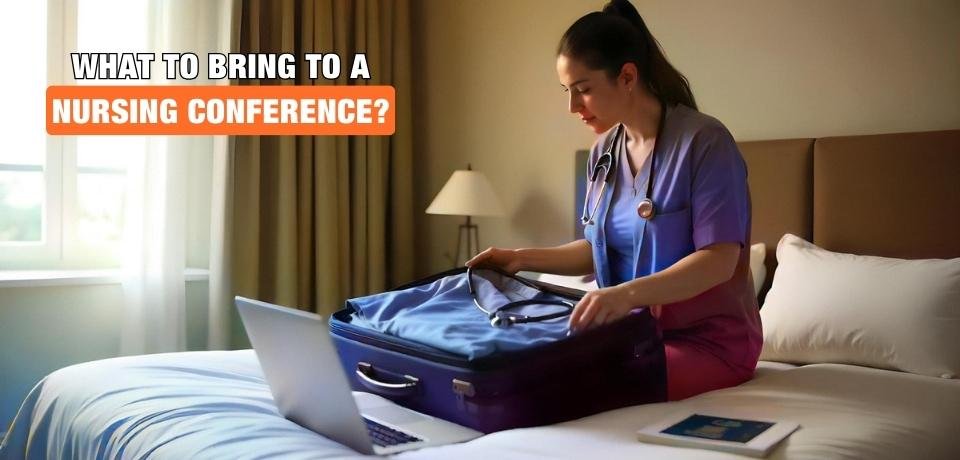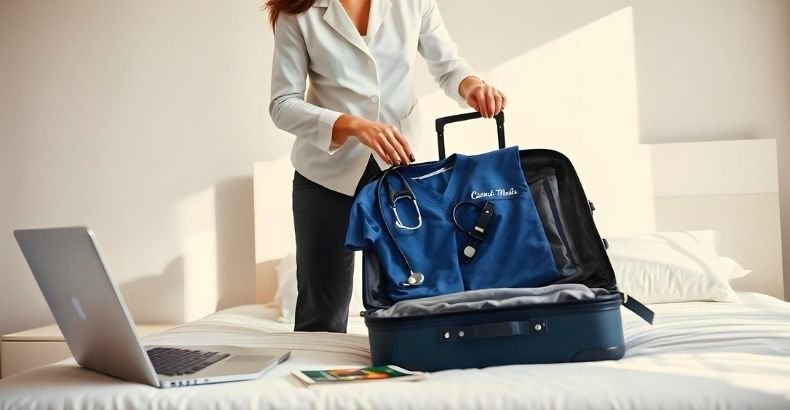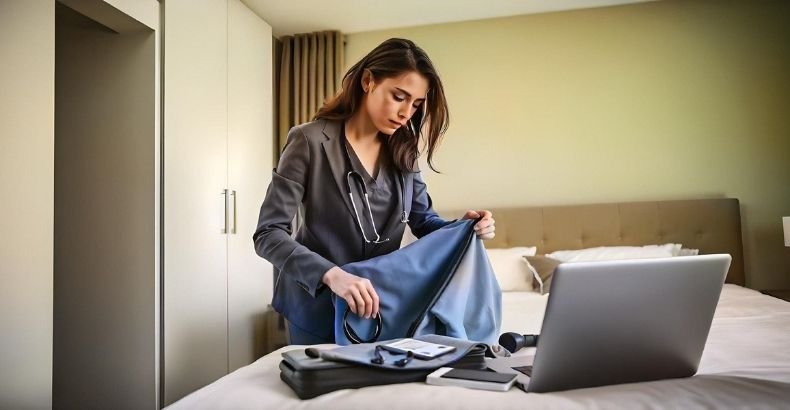Attending a nursing conference is an exciting opportunity to learn, network, and grow in your profession. However, the key to a successful experience often lies in your preparation. Knowing exactly what to bring to a nursing conference can make all the difference.
So, what should you pack? Essential items include personal necessities, professional materials, and tools to help you engage fully with the experience. This thoughtful preparation ensures you can focus on learning and connecting without the stress of forgetting something important.
Are you ready to learn more? In this article, we’ll explore everything you need to know about what to bring, from must-have personal items to professional tools. Keep reading to ensure you’re fully prepared for your next conference adventure.
The Importance of Preparation for Nursing Conferences
Preparing for a nursing conference is essential for a successful experience. When you plan ahead, you minimize stress and can fully engage with the sessions and networking opportunities. Preparation helps you make the most of your time and resources.
Many nurses attend conferences to gain new insights and improve their skills. Being prepared allows you to focus on these goals rather than scrambling for materials or supplies. As you look ahead to the upcoming international nursing conference, it also demonstrates professionalism, which can leave a positive impression on peers and leaders in your field.
Additionally, conferences can be overwhelming with numerous sessions and activities. Having everything organized and ready to go can make a significant difference in how well you handle the event. This preparation enables you to embrace the learning experience with confidence.
What to Bring to a Nursing Conference?
When it comes to what to bring to a nursing conference, having a well-planned list is essential. This ensures you have everything you need to engage fully in the experience. Here’s an inclusive breakdown of the key items you should pack.

Personal Items
Identification: Always carry a government-issued ID. This may be required for registration or hotel check-in.
Business Cards: Bring multiple business cards to share with new contacts. This is essential for networking and keeping in touch later.
Comfortable Clothing: Choose professional yet comfortable attire. You’ll likely be walking a lot and sitting for extended periods. Professional outfits for nursing conferences should balance style and comfort, allowing you to focus on the event rather than adjusting your clothing.
Snacks: Pack healthy snacks to keep your energy up. Granola bars or nuts are great options that travel well.
Reusable Water Bottle: Stay hydrated by bringing a refillable water bottle. Many venues provide water stations, making it easy to fill up.
Professional Materials
Notebook and Pens: Take notes during sessions to remember key points and insights. This is vital for retaining information and for future reference.
Laptop or Tablet: Consider bringing a device for taking notes or accessing online resources. Ensure it is fully charged and has all necessary documents downloaded.
Conference Agenda: Have a printed or digital version of the conference agenda. This will help you plan your day and choose which sessions to attend.
Presentation Materials: If you’re presenting, make sure to pack any materials you need. This includes slides, handouts, and any equipment.
Organization Tools
Folder or Binder: Use a folder or binder to keep all your materials organized. This can help you quickly find what you need during the conference.
Labeling System: Consider labeling sections in your binder. This can make it easier to locate specific notes or documents quickly.
Technology Essentials
Chargers: Bring chargers for all your devices. This includes phone chargers, laptop chargers, and portable chargers for backup.
Wi-Fi Access: Check if the venue offers free Wi-Fi. If not, consider bringing a portable hotspot for internet access.
Headphones: Bring headphones if you plan to listen to sessions or music during downtime. This can help you focus in busy environments.
Health and Wellness Items
Medications: Don’t forget any personal medications you may need. Keep these in your carry-on for easy access.
First Aid Kit: A small first aid kit can be helpful. Include items like band-aids, pain relievers, and any other personal necessities.
Comfort Items: Consider bringing a travel pillow or blanket for comfort during travel or downtime at the conference.
Steps for Effective Packing
Create a Checklist: Before you start packing, write down everything you need to bring. This helps you avoid forgetting important items.
Pack Early: Aim to pack your bags at least two days before the conference. This allows time to think of anything else you might need.
Organize by Category: Pack items by category (personal, professional, tech) for easy access. This makes it simpler to find what you need during the event.
By following this guide on what to bring to a nursing conference, you can ensure a successful and productive experience. Preparation is key, and having everything organized will help you focus on what truly matters: learning and networking.
What Professional Materials Should You Pack: In-depth discussion
Packing professional materials is a critical aspect of preparing for a nursing conference. These items will help you engage effectively, present your best self, and make the most out of your experience. Here’s what you need to consider:

Conference Agenda and Program
Before the conference, review the agenda to familiarize yourself with the sessions and speakers. Print a copy or save a digital version on your device. This will help you plan which sessions you want to attend and ensure you don’t miss important presentations.
Presentation Materials
If you are a speaker, ensure you have all presentation materials ready. This includes slides, handouts, and any necessary equipment. Double-check that your presentation is saved on multiple devices (like a USB drive and cloud storage) to prevent last-minute issues.
Note-taking Supplies
Bring a notebook and pens or a tablet for digital notes. Effective note-taking allows you to capture key insights and ideas during sessions. This is valuable for reflecting on what you learned after the conference.
Business Cards
Networking is a significant part of any conference. Bring plenty of business cards to share with new connections. Having these on hand will facilitate communication and help maintain professional relationships after the event.
Portfolio or Professional Folder
Consider bringing a professional folder to organize your documents. This can include your resume, references, or any materials you may want to share with potential employers or collaborators. A tidy presentation makes a positive impression.
Laptop or Tablet
If you prefer digital note-taking, bring your laptop or tablet. Ensure it is fully charged and loaded with relevant documents. Additionally, consider bringing a charger to keep your device powered throughout the day.
Informational Pamphlets
If you represent an organization, bring brochures or promotional materials. This is an excellent way to share information about your organization and its services. These materials can also be beneficial for networking opportunities.
Writing Materials for Networking
Consider bringing a small notebook specifically for networking. This can be used to jot down names, contact information, and notes about the people you meet. Having this information recorded can be helpful for following up later.
Feedback Forms
If you’re participating in a workshop or presenting, consider bringing feedback forms. These allow attendees to provide input on your session, which can be valuable for future improvements. Providing a way for attendees to share their thoughts can enhance your professional reputation.
How to Organize Your Conference Materials Effectively?
Effective organization of your conference materials can simplify your experience and help you focus on learning and networking. Here’s how to do it:

Create a Master List
Start by creating a master list of everything you need to bring. This should include personal items, professional materials, and technology essentials. Having a list helps you avoid last-minute packing stress.
Categorize Your Items
Group your items into categories such as personal, professional, and technology. This categorization makes it easier to find what you need during the conference. You can also pack them in separate bags for convenience.
Use a Packing Organizer
Consider using packing organizers or cubes to separate different types of items. This keeps everything in its place and prevents your bag from becoming a mess. Label each organizer for even easier access.
Plan Your Day
Review the conference agenda and plan your day around the sessions you want to attend. Create a schedule and highlight key sessions. This planning allows you to allocate time for networking and breaks effectively.
Utilize Digital Tools
Use apps or digital calendars to keep track of your schedule. Many conferences have their own apps that provide real-time updates. This digital organization can help you stay informed and connected during the event.
Set Reminders
Set reminders on your phone or digital calendar for important sessions or networking opportunities. This helps ensure you don’t forget key events and can manage your time effectively throughout the day.
Designate a Networking Folder
Create a specific folder for business cards and materials collected during networking. This keeps everything in one place and makes it easier to follow up with new contacts after the conference.
Prepare for Sessions in Advance
Before attending sessions, review any materials or articles related to the topic. This will help you engage more actively and ask informed questions. Being prepared can help you improve your learning experience.
Keep Your Materials Accessible
Organize your materials in a way that makes them easy to access during the conference. Place frequently used items in the outer pockets of your bag. This saves time when you need to grab something quickly.
Reflect After Each Day
At the end of each conference day, take some time to reflect on what you learned and who you met. Take notes on key takeaways and action items. This reflection can help reinforce your learning and keep you motivated.
By organizing your conference materials effectively, you can get through the event with confidence and focus on maximizing your experience.
Preparing for Workshops and Sessions: What to Consider?
Workshops and sessions are the main aspects of a nursing conference. To make the most of the learning opportunities, you need to prepare well for these activities. Here’s what you can consider:
Research Workshop Topics
Before the conference, research the topics of the workshops you plan to attend. Familiarizing yourself with the subject matter can help you engage more effectively. It also allows you to formulate questions in advance.
Arrive Early
Plan to arrive at each session early. This gives you a chance to choose a good seat and settle in before the session starts. Arriving early also allows you to network with other attendees before the session begins.
Participate Actively
During the workshops, don’t hesitate to participate actively. Ask questions and share your insights. Engaging with the material can deepen your learning and make the experience more valuable.
Take Comprehensive Notes
Be sure to take thorough notes during each session. Highlight key points and note examples or anecdotes shared by the speakers. This will help you retain important information and refer back to it later.
Network During Breaks
Use breaks between sessions to network with other attendees. Introduce yourself and discuss what you learned in the previous session. This can lead to valuable connections and insights from peers.
Bring Relevant Materials
For workshops that require relevant materials, ensure you bring everything needed. This may include laptops, notepads, or any specific tools mentioned in the agenda. Being prepared shows professionalism and dedication.
Stay Open-Minded
Stay open-minded throughout the conference by approaching each session with curiosity and a willingness to explore fresh perspectives. Include new ideas, even if they challenge your existing knowledge, as this mindset promotes growth, increases learning, and leads to deeper insights and connections.
Ask for Clarifications
If you don’t understand something during a session, don’t hesitate to ask for clarification. Speakers often appreciate questions, and it benefits everyone to address confusion. Engaging in discussions enhances the learning experience.
Connect With Speakers
After sessions, take the opportunity to connect with speakers. Approach them with thoughtful questions or comments about their presentation. This can lead to meaningful connections and mentorship opportunities.
By preparing for workshops and sessions thoughtfully, you can maximize your learning and create lasting connections at the conference.
Travel Essentials for Attending a Nursing Conference
Traveling to a nursing conference requires careful planning to avoid hassle and ensure a smooth journey. Here are some travel essentials to consider:

Travel Documents
Ensure you have all necessary travel documents, including your ID and invitation letter provided by the conference host. Having these documents organized and easily accessible will prevent stress during your trip.
Accommodation Confirmation
Bring a printed or digital copy of your accommodation confirmation, including the hotel’s address and contact details. This ensures a smoother check-in process, helps avoid any last-minute confusion, and provides easy access to important information if needed.
Transportation Arrangements
Plan your transportation to and from the conference venue well in advance. Decide if you’ll be using public transportation, rideshares, or driving, and map out the route. This preparation can save you significant time, money, and hassle.
Packing for Different Weather
Check the weather forecast for the conference location. Pack clothing suitable for the expected conditions, including layers for changing temperatures. Dressing for a summer conference as a female or male may involve lighter fabrics and breathable materials. Being prepared for weather variations ensures your comfort.
Travel Insurance
Consider purchasing travel insurance for added peace of mind when attending a conference. It can provide financial protection against unexpected events like trip cancellations, medical emergencies, or lost luggage, ensuring a more secure and worry-free travel experience.
Emergency Contacts
Write down emergency contact information, including local emergency services and contacts back home. Having this information readily available can be crucial in case of unforeseen situations.
Health and Safety Supplies
Pack health and safety supplies such as hand sanitizer, face masks, and any personal medications you may need. Staying healthy while traveling is important, especially in crowded environments.
Comfort Items for Travel
Consider bringing comfort items to make your travel experience more enjoyable, especially for longer journeys. Essentials like a neck pillow, cozy blanket, and noise-canceling headphones can help you relax, rest, and block out distractions.
Plan to arrive a day before the conference begins if possible. This allows you to settle in and adjust to the new location, reducing stress on the first day of the event.
Tips for Managing Your Time Effectively During the Conference
Managing your time effectively during a nursing conference is key to making the most of your experience. Here are some tips to help you get through the busy schedule:
- Prioritize Your Agenda: Before the conference, review the agenda and prioritize sessions that are most relevant to your interests and goals. Mark these sessions clearly to ensure you don’t miss them.
- Set Daily Goals: At the beginning of each day, set specific goals for what you want to accomplish. This could include attending certain sessions, networking with specific individuals, or learning about specific topics.
- Use Time Blocks: Allocate time blocks for each activity in your schedule, including breaks and networking. This helps create a balanced agenda that allows for rest and socializing.
- Limit Distractions: During sessions, limit distractions by putting your phone on silent and focusing on the speaker. Staying engaged at the moment will improve your learning and make it easier to retain information.
- Take Breaks: Remember to schedule breaks between sessions. Taking short breaks allows your mind to recharge and helps prevent burnout throughout the day.
- Stay Flexible: While it’s important to have a plan, stay flexible, and be open to spontaneous opportunities. You may find new sessions or connect with people you hadn’t anticipated meeting.
- Use a Conference App: Many conferences offer mobile apps with schedules, maps, and updates. Download the app to stay informed about any changes and simplify your experience during the event.
- Engage With Others: Use networking opportunities to engage with other attendees during breaks. Sharing experiences and insights can lead to valuable discussions and connections.
- Follow-Up Post-Conference: After the conference, follow up with new contacts and connections you made. Send emails or LinkedIn requests to maintain the relationships you established during the event.
By managing your time effectively, you can improve your experience at the nursing conference and ensure you leave with valuable knowledge and connections.
How to Follow Up After the Conference: Essential Items to Remember?
Following up after a nursing conference is essential to maintain connections and reinforce your learning. Here’s a detailed guide on how to follow up effectively to maximize your experience and build lasting professional relationships.

Organize Your Contacts
After the conference, take time to organize business cards and contact information collected. Creating a list or using a contact management tool makes it easier to recall who you met and what you discussed. This simple step can help you build a network that’s accessible and useful for future interactions.
Send Thank You Notes
Consider sending thank-you notes or follow-up emails to people you connected with at the conference. Expressing gratitude and acknowledging your conversation leaves a positive, lasting impression. It reinforces your professional connections and can make others more likely to stay in touch.
Share Your Key Takeaways
Engage your new contacts by sharing your key takeaways from the conference. This can lead to engaging discussions and provide an opportunity to exchange insights and perspectives. It also helps strengthen connections by keeping the conversation alive beyond the event.
Connect on Social Media
Following your new contacts on platforms like LinkedIn is a great way to maintain professional ties. This keeps you up to date with their professional achievements and insights, and they’ll see your updates as well. Engaging with their posts can further strengthen these new relationships.
Review Your Notes
Set aside time to thoroughly review the notes you took during the conference. Highlight key strategies or ideas that you feel are especially valuable for your practice. This reflection reinforces what you learned and helps you identify actionable items to implement.
Implement New Knowledge
Think about ways to apply what you learned at the conference within your daily practice. Setting specific goals for applying new strategies or techniques can make the process more effective. This will help you stay committed to continuous learning and professional development.
Engage in Online Discussions
Consider joining online discussions related to the topics covered at the conference. Engaging with others in the nursing field can deepen your understanding and broaden your perspective. This active participation can also introduce you to new ideas and additional resources.
Join Professional Groups
Explore professional nursing groups or associations relevant to the topics discussed at the conference. Joining such groups can offer ongoing learning, valuable networking opportunities, and access to current industry trends. This involvement is a powerful way to continue growing professionally.
Plan for Future Conferences
Reflect on your recent conference experience and consider areas for improvement for future events. Think about refining your goals, adjusting materials, or even changing networking strategies. This preparation can make your next conference experience even more valuable and rewarding.
Stay in Touch
Maintaining regular contact with new connections can transform brief meetings into lasting professional relationships. Sending occasional messages, sharing relevant articles, or updating them on your work progress can keep the relationship warm. This effort builds a supportive network that can benefit your career long-term.
By following these steps, you can make the most of your conference experience and develop a strong, lasting professional network.
Frequently Asked Questions
When preparing for a nursing conference, attendees often have a few last-minute questions on what essentials to pack and how to get the most out of the experience. Here are some frequently asked questions to help make your planning smoother.
What Clothing Should I Wear to a Nursing Conference?
Dressing in business-casual attire is generally recommended for nursing conferences. Comfortable shoes are also essential, as you may be walking or standing for extended periods. If the conference spans multiple days, consider bringing layers or a mix of outfits to adjust for varying room temperatures or outdoor weather.
How Early Should I Arrive on the First Day of the Conference?
Arriving 30–45 minutes early on the first day is a good idea. This will give you time to adjust to the conference atmosphere, find the opening session location, and settle in before things get busy. Being early also allows you to get a feel for the venue layout, making it easier to find rooms later on.
Are There Specific Items That Might Make Networking Easier?
Yes, in addition to business cards, a small notebook or digital app can be helpful for writing down notes about people you meet. You might also consider bringing a LinkedIn QR code on your phone for quick and easy connections. Small touches like remembering someone’s name or the conversation you had can go a long way in building meaningful relationships.
Will I Receive Handouts, or Should I Bring My Own Materials?
Most conferences provide handouts or digital materials, but it’s wise to bring a notebook and a few pens just in case. Sometimes, digital resources are sent after the conference, so taking notes will ensure you don’t miss key information in real-time. Plus, personal notes can help you remember specific insights that may not be covered in handouts.
How Much Time Should I Plan for Breaks?
Break times can vary by conference, but it’s helpful to use these times not only to recharge but also to network. Plan to grab a quick snack, check your email, or connect with other attendees in the break area. Having a light schedule during breaks keeps you refreshed and ready for the next session.
Can I Attend Sessions From Different Tracks or Themes?
Usually, you can attend sessions from different tracks, especially if the conference is structured to encourage exploring diverse topics. Some conferences require prior registration for certain sessions, so check the guidelines beforehand. Mixing tracks can help you gain broader insights and meet a variety of professionals.
Final Words
As you prepare for your next nursing conference, remember that thoughtful packing can help improve your overall experience. Knowing what to bring to a nursing conference equips you to fully engage and seize every opportunity for growth and connection.
By gathering the right personal and professional items, you can deal with the event with confidence. Whether it’s networking with peers or diving into informative sessions, your preparation sets the stage for success.
So, take a moment to review your checklist and ensure you’re ready for an enriching experience. With the right tools in hand, you’ll be well on your way to making the most of this exciting journey.